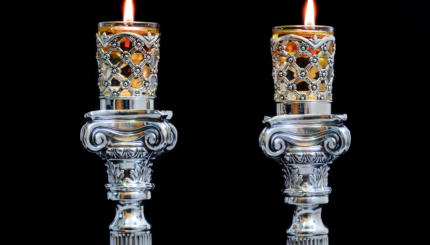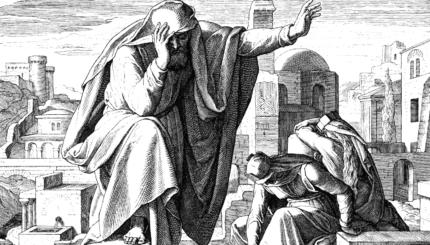During the month of Elul, the month before Rosh Hashanah, the shofar is blown every morning at synagogue. The sound of the is meant to wake something in us, to stir us to think about our actions, make resolutions for the year to come, and above all, to repent. The shofar is a primitive instrument, fashioned out of a ram’s horn, and its voice can be very powerful, but many of us also prepare for the High Holidays with more contemporary music. We asked everyone here at the MyJewishLearning to share their favorite songs to listen to during the intense emotional month of Elul. Here’s our list of recommended listening. We hope it makes your High Holiday preparations spiritually fulfilling, and rockin’.
Daniel Septimus, Editor in Chief
Re: Stacks by Bon Iver
The singing in “Stacks” turns my kishkes like no other song from the last couple of years. I don’t have a clue what the lyrics mean, but the end of the song does seem to refer to beginning a process of reinvention: “This is not the sound of a new man or crispy realization/It’s the sound of the unlocking and the lift away.” (Oh, and there’s some strange reference to Qumran at the beginning of the song, too, so I guess it’s a totally Jewish song, too.)

Help us keep Jewish knowledge accessible to millions of people around the world.
Your donation to My Jewish Learning fuels endless journeys of Jewish discovery. With your help, My Jewish Learning can continue to provide nonstop opportunities for learning, connection and growth.
Jazon Brzoska, Chief Operating Officer
Mojo Pin by Jeff Buckley
Box of Rain by the Grateful Dead
Meredith Lewis, Senior Editor
Just Dance by Lady Gaga
It might seem ridiculous but my song for this year is “Just Dance,” by Lady Gaga. The song’s lyrics are about just getting forgetting everything and living in the moment. That everything is “gonna be okay.”
It seems totally silly, but sometimes hearing the song makes me pause and just let loose. For those of us that spend the rest of year thinking quite a bit, the High Holidays can actually be a time to focus on the goodness of the New Year, and put our regrets in the past.
As the famous scenes of Meredith and Christina on Grey’s Anatomy prove, sometimes a dance party is needed.
Tamar Fox, Associate Editor
Struggle Leads to Grace by Rachel Griffin
A Change Is Gonna Come by Sam Cooke
This year has been a pretty rough one for me. And adding to the frustration, though I love music and going to live shows, I’ve had to abstain from live entertainment this year because I’m in mourning. Moving to New York but not being able to see your favorite bands even when they’re playing just down the street–that is no fun, my friends. But as a result of not going out I’ve discovered lots of interesting music online, and rediscovered some classics that suddenly speak to me more than ever.
My first song is one I discovered via the All Songs Considered Blog when they sponsored a contest for Obama-related songs during the week of the President’s inauguration. I know nothing about Rachel Griffin, but she has an amazing smoky voice, and the lyrics here are gorgeous and simple. My Sam Cooke choice might seem a little cliché, but I only really discovered his music a few months ago (even though my grad school advisor was his biographer) and this song slays me every time.
Matthue Roth, Associate Editor
Waltz #2 by Elliott Smith
I really don’t want this song to mean repentance to me. Elliott Smith was a genius, but a tragic, fractured one — he was in denial about his drug habits until the end, and he was as emotionally shifty and conflicted as could be. But it’s a beautiful song, simple and earnest and meaningful. It seems like he’s trying to set aside all of his baggage and just focus on relationships…either between himself and other people, or between himself and God. Maybe I’m reaching, but the Ten Days of Repentance are about both.
Jeremy Moses, Editorial Fellow
Your Ex-Lover is Dead by Stars
There is something very familiar to the sound of the shofar. Every year, it is the exact same, but it is always welcoming and refreshing. So when I listen to Stars’ “Your Ex-Lover is Dead,” I get those same feelings. While the lyrics are somewhat dark, the music is so mesmerizing that I can listen to it on repeat without ever getting tired. Add in all of the Montreal references (my hometown), and you have a perfect song. As an extra plus, my cousin is in the music video. The high holidays are all about family, right?
Jordanna Birnbaum, Editorial Intern
Unsung Psalm by Tracy Chapman
Don’t Give Up by the Moshav Band
An interesting idea I heard about teshuva recently:
The Rambam talks about teshuva as a renewal. Each person must become a totally new being at the end of the process with improved character traits. As the Rambam is famous for stating, true teshuva is when a person returns to the same situation and does not commit the transgression again. Rav Kook‘s school of thought describes teshuva as returning to who we really are and finding our “true selves”. The Rambam and Rav Kook have seemingly contradictory thoughts on teshuva. Are we becoming a new person, transforming ourselves, or are we returning to who we really are?
I liked this tension of ideas.


